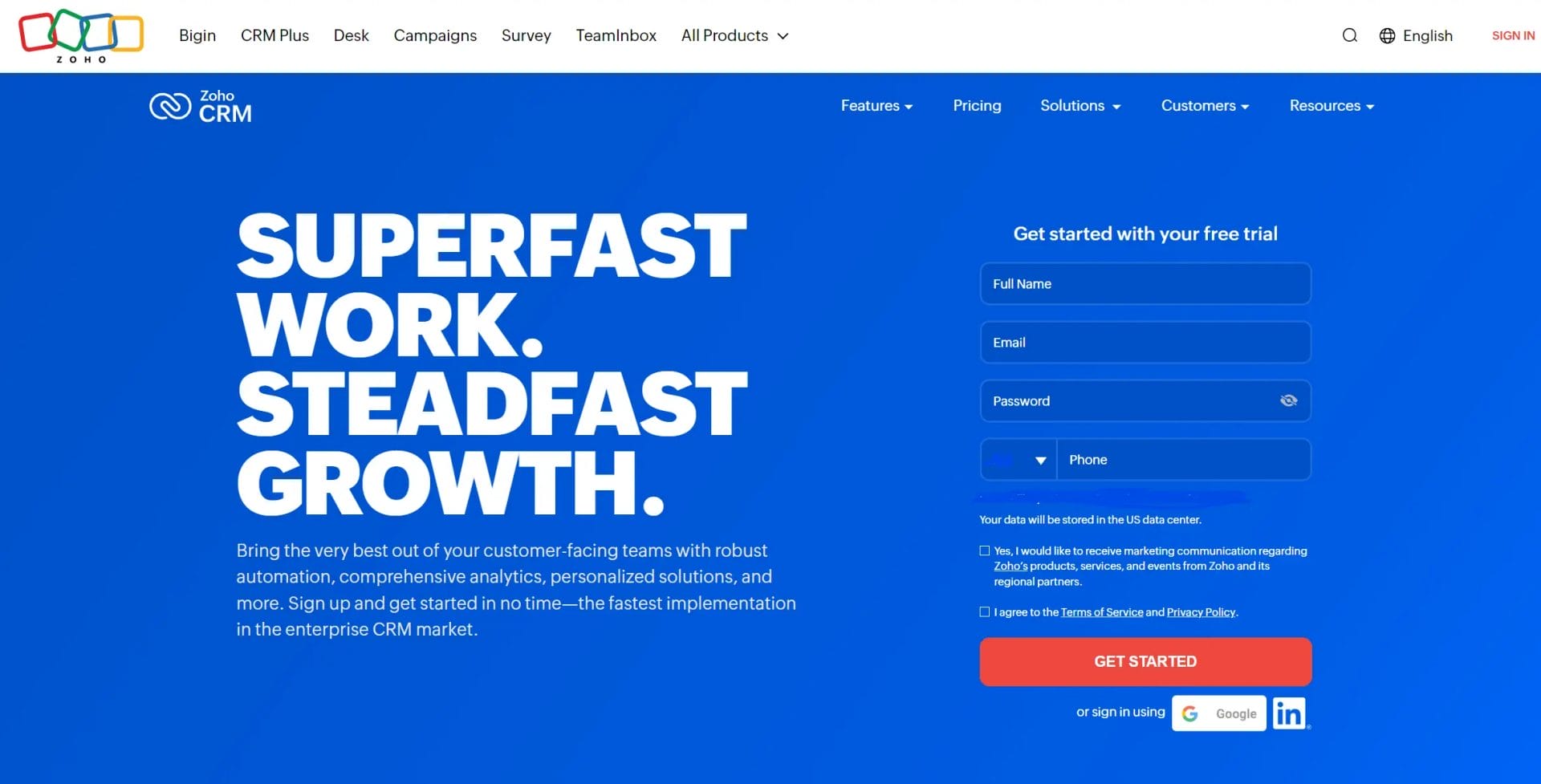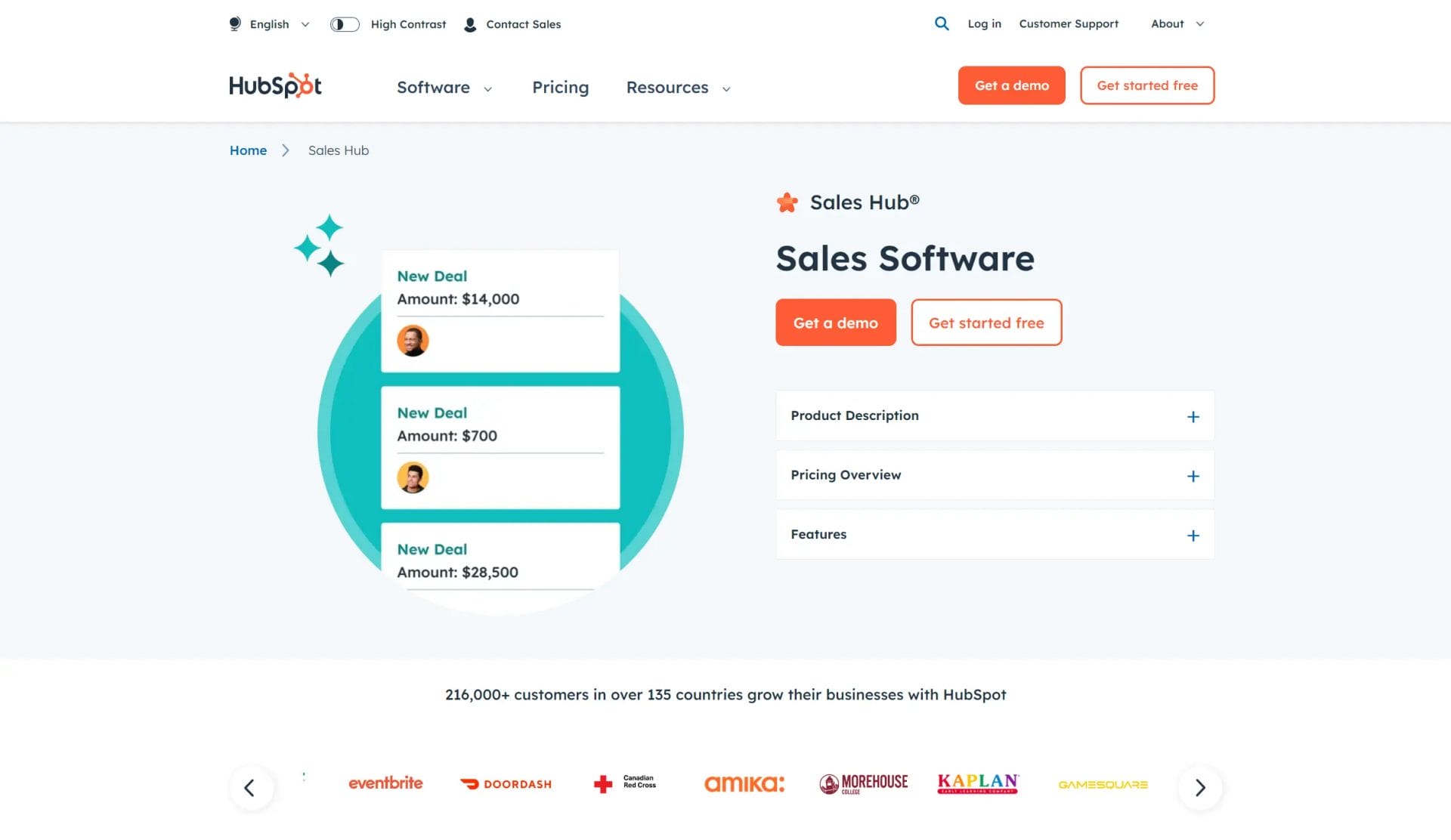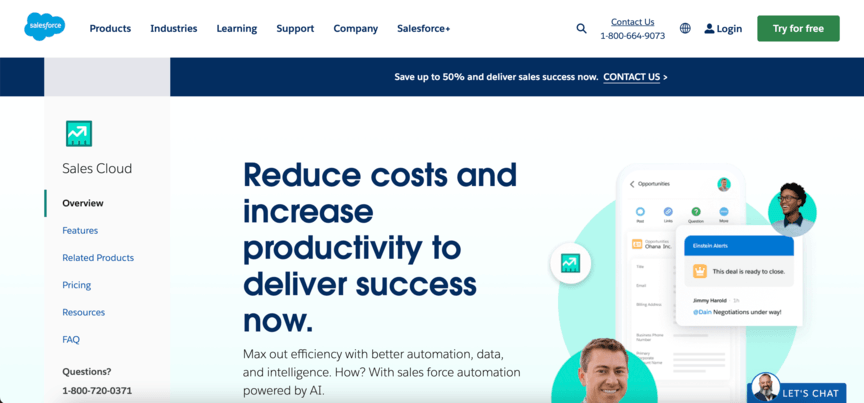
The concept of CRM has evolved significantly over the years. In the 1980s and 90s, sales teams used simple contact management systems and digital Rolodexes. In the mid-1990s, Sales Force Automation (SFA) began to streamline sales processes, and the modern CRM began to take shape.
In the mid-2000s, cloud computing was introduced, which made web-based CRM software possible and transformed the sales world. This innovation made CRM tools more accessible, affordable, and scalable for all sorts of businesses.
Today, web-based CRMs are a business necessity, helping companies manage their contacts and sales processes. In fact, 87% of businesses now use a cloud-based CRM system.
Let’s take a closer look at what cloud-based CRM can do for your business.
Web-based CRM software, also called cloud-based CRM software, is a technology that allows businesses to manage their contacts, analyze customer interactions, and automate their sales and marketing processes. Web-based CRMs are hosted on the CRM provider’s servers and are accessible through a web browser. This software-as-a-service (SaaS) model provides businesses with a flexible solution for managing their sales, marketing, and customer service.
The main difference between traditional and cloud-based CRM systems is where the software and data are hosted.
Traditional, on-premise CRM is installed on the servers of the business using the software at the company’s physical office location. Cloud-based CRM software is hosted by the CRM vendor, and the company using the software accesses it via the Internet.
Web-based CRMs have become essential for today’s businesses. They enable businesses to store and manage their customer information, from contact details to customer service conversations to purchase history, in a central location. They also enable streamlined management and automation of sales and marketing processes.
Cloud-based CRM tools offer several advantages over traditional, on-premise CRM software, including:
If you’re looking for a cloud-based CRM, you’ll find a wide array of options. Here’s a look at some of the top platforms:
| CRM | Key features | Best for: |
| Nutshell | • All-in-one sales and marketing tools • User-friendly interface • Unlimited contact storage • Strong sales automation | Small to medium-sized businesses (SMBs) and sales teams looking for a straightforward, powerful solution with excellent support |
| Pipedrive | • Highly visual, Kanban-style sales pipeline • Activity-based selling methodology • AI-powered sales assistant • Large integration marketplace | Sales-focused teams and SMBs that prioritize a clean, intuitive interface for managing deals and sales activities effectively |
| Monday CRM | • Extremely visual and customizable workflows • Built on the flexible monday.com Work OS • Strong team collaboration features • Drag-and-drop interface | Creative, fast-moving teams and businesses that require a highly adaptable and collaborative platform for managing sales and other projects |
| Zoho CRM | • Part of a comprehensive suite of business apps • Extensive customization options • AI assistant (Zia) for predictions • Advanced analytics and reporting | Businesses of all sizes (especially SMBs) seeking a cost-effective, all-in-one solution and are willing to invest time in its setup |
| HubSpot | • Integrated platform (Marketing, Sales, Service) • Popular free CRM plan • Excellent for inbound marketing automation • User-friendly interface | Businesses of all sizes focused on inbound marketing and sales, and those wanting a single platform to manage the entire customer lifecycle |
| Salesforce | • Highly scalable and powerful • Advanced AI (Einstein) for forecasting • 360-degree view of the customer • Massive AppExchange for integrations | Large enterprises or businesses with complex sales processes that need a robust, highly customizable, and industry-leading CRM solution |

Nutshell is a comprehensive, cloud-based CRM platform with powerful sales, marketing, and engagement features. It enables sales and marketing teams to seamlessly collaborate, ultimately driving more successful deals. Its intuitive, user-friendly interface significantly reduces the need for extensive training, making it accessible to all.
The platform boasts a robust suite of features, including sales automation, efficient pipeline management, comprehensive contact management, integrated email marketing tools, and built-in AI agents. Nutshell is renowned for its simplicity and powerful, ready-to-use reporting capabilities, enabling outbound sales teams to manage their processes with maximum efficiency.
A key differentiator is Nutshell’s commitment to unlimited contact storage and data, a standard inclusion with every subscription. The platform also offers exceptional customer support, providing invaluable assistance to smaller teams that may lack dedicated IT personnel. Nutshell seamlessly integrates with a wide array of popular business applications, such as Google Workspace, Microsoft Office, Mailchimp, and Slack, ensuring a connected workflow.
With its focus on a clean design and practical, sales-oriented functionalities, Nutshell presents a compelling solution for businesses seeking a straightforward yet powerful CRM software to streamline their operations and boost sales performance.

Pipedrive, launched in 2010, is a cloud-based CRM designed for sales teams. It is known for its clean, intuitive, and visual interface, utilizing a drag-and-drop Kanban-style layout to visualize and manage the sales pipeline. This activity-based selling approach helps sales representatives organize tasks, prioritize actions, and maintain momentum to close deals more quickly. Pipedrive is particularly well-suited for small to mid-sized businesses seeking a tool with minimal setup and a short learning curve.
In addition to its primary pipeline management features, Pipedrive offers email and call tracking, workflow automation for repetitive tasks, and an AI-powered sales assistant. It integrates with various other business tools, creating a robust ecosystem. While highly effective for sales process management, Pipedrive may be less ideal for organizations heavily focused on marketing or enterprises with exceptionally complex workflows. Its core strength lies in its focused, user-friendly design, empowering sales teams to enhance their efficiency.

Monday CRM, built on the versatile Monday.com Work OS, redefines customer relationship management with its highly visual and adaptable design. It empowers teams to craft their workflows freely, making it ideal for businesses seeking a modern, collaborative, and flexible platform. Its intuitive drag-and-drop interface simplifies project and sales pipeline management.
This CRM is especially beneficial for small to medium-sized businesses that prioritize innovation and iterative process improvements. It offers robust features such as customizable dashboards, lead capture, activity tracking, and extensive automation to minimize manual effort. While Monday CRM is user-friendly with a rapid learning curve, its analytical capabilities might not be as advanced as those found in some other CRM platforms. Nevertheless, its seamless integration with other cloud services and a powerful mobile application make it an effective solution for remote and agile teams.

Zoho CRM is a comprehensive and powerful platform that is part of a much larger suite of business applications. This makes it an attractive option for businesses looking for an all-in-one solution that integrates sales, marketing, and customer support. It is highly customizable, allowing businesses to tailor the software to their specific workflows and requirements. Zoho is often considered a cost-effective alternative to other major CRMs, making it a popular choice for small to medium-sized businesses.
The platform boasts a wide array of features, including sales and marketing automation, advanced analytics, and an AI-powered assistant named Zia that provides predictions and insights. However, the sheer number of features and customization options can be overwhelming for new users, leading to a steeper learning curve. While its interface is considered modern and user-friendly by some, others find it complex to navigate. Despite this, its robust functionality and integration capabilities make it a powerful contender for businesses willing to invest time in its setup.

HubSpot offers a leading all-in-one cloud-based CRM platform that integrates marketing, sales, customer service, and content management into a single, unified system. Its greatest strength lies in its user-friendly interface and the “flywheel” model, which focuses on creating a seamless customer experience to drive growth. HubSpot is particularly famous for its robust free CRM offering, which provides essential tools like contact management, deal tracking, and email marketing to businesses of all sizes.
The platform is built around a central CRM database, ensuring a single source of truth for all customer interactions. This allows for powerful marketing automation, where personalized communications can be triggered based on customer data and behavior. While the free version is capable, more advanced features are available in its various paid “Hubs” for Marketing, Sales, and Service. The platform is highly scalable and continuously evolving, making it an excellent choice for businesses focused on growth and looking for a platform that can support the entire customer lifecycle.

Salesforce’s Sales Cloud is a premier platform in the CRM market, built to accelerate and optimize sales for teams. It’s highly scalable and serves businesses of all sizes, though it’s especially popular with large enterprises managing intricate sales cycles. The platform offers a unified 360-degree customer perspective by integrating data from sales, service, marketing, and other departments.
Salesforce boasts a wide range of features, including strong contact and opportunity management, workflow automation, sophisticated analytics, and potent sales forecasting. Its AI, Einstein, delivers predictive insights and automates tasks to enhance productivity. A significant benefit of Salesforce is its expansive AppExchange, a marketplace with many integrations to expand the platform’s capabilities. Although it is among the most powerful and adaptable CRMs on the market, its complexity can result in higher costs and a more challenging learning curve compared to alternative solutions.
The CRM tool you use can have a major impact on your business, so it’s important to carefully weigh your options. Here are some key elements to consider when choosing a cloud-based CRM solution.
Find the perfect CRM solution to improve your team’s efficiency, build stronger customer relationships, close more deals, and boost revenue.

The world of cloud-based CRM software is constantly evolving with technological advancements. Looking ahead, several key trends are set to redefine customer relationship management.
The most significant is the increasing integration of artificial intelligence (AI). AI is moving from a premium feature to a standard component, powering everything from predictive analytics for sales forecasting to intelligent lead scoring that helps teams focus on the most promising opportunities. Generative AI, in particular, is transforming productivity by automating the creation of content like sales emails and marketing copy.
Another major trend is the move toward hyper-personalization. Modern CRMs are leveraging AI and real-time data to deliver experiences tailored to individual behaviors and preferences, moving far beyond simple name tokenization. This allows businesses to anticipate customer needs and deliver highly relevant content and offers.
Also expect to see an increased focus on omnichannel experiences, where CRMs provide a unified view of the customer across all touchpoints, and a continued rise of low-code or no-code platforms that empower non-technical users to build custom workflows and automations.
This evolution points to a future where CRMs are more intelligent, predictive, and central to the entire customer journey.
Web-based CRM software is a cloud-hosted application that allows businesses to manage customer interactions and data through a web browser. It operates on a subscription model, eliminating the need for on-premise hardware and software installation.
A web-based CRM can help your business by increasing efficiency through automation, improving customer engagement with personalized interactions, and providing real-time data and analytics for better decision-making.
Reputable web-based CRM providers prioritize data security and invest in robust measures to protect your information. They also typically offer high levels of uptime and reliability.
Yes, most modern web-based CRM platforms offer a wide range of integrations with popular business applications such as email clients, marketing automation software, and accounting tools.
The cost of web-based CRM software typically involves a monthly or annual subscription fee per user. While some providers offer free plans with limited features, paid plans vary in price depending on the features and number of users.
Embracing a web-based CRM solution can revolutionize the way you connect with your customers and drive growth.
Let us show you how our powerful and intuitive web-based CRM software can be tailored to meet the unique needs of your business. Start your free 14-day trial today.

Join 30,000+ other sales and marketing professionals. Subscribe to our Sell to Win newsletter!